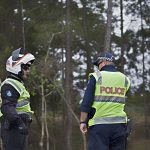Sydney Terror Duo Sentenced to Twenty Years Imprisonment

Sydney men Omar Al-Kutobi and Mohammad Kiad were sentenced to 20 years in prison last Friday for plotting a terrorist attack. However, under new laws passed through federal parliament earlier this month, the pair could potentially face indefinite detention.
On February 8 last year, Al-Kutobi and Kiad went to a Shiite prayer hall in south Granville planning to blow it up with a petrol bomb. But they discovered someone in the hall at the time and abandoned the plan.
The pair were found to have then decided to attack someone with a bladed weapon two days later.
Police raided a granny flat at the backyard of a house in Fairfield where the two men were living on February 10 last year. Officers found a machete, hunting knife and a homemade Islamic State (IS) flag inside the residence.
The pair were charged with undertaking acts in preparation or planning for a terrorist act.
Raided hours before the attack
NSW police received a tip-off that the men were about to make their second attempt at an attack on the day of the raid. At the time, Al-Kutobi and Kiad had been under surveillance for a month.
Police said that at 3 pm that day, the men had bought a hunting knife from a military supply store to use for the attack.
Twenty minutes before police arrived, the pair were said to be making a video with Al-Kutobi, armed with a knife, kneeling in front of an Islamic State flag vowing to stab people in the kidneys.
“The type of act that we will allege that was going to be undertaken is consistent with the messaging coming out of IS,” NSW deputy police commissioner Catherine Burn said at the time. “We believe that the men were potentially going to harm somebody, maybe even kill somebody.”
On July 27 this year, less than a week before their trial was to begin Al-Kutobi, 25, and Kiad, 27, pleaded guilty in the NSW Supreme Court.
ASIO was being fed information
During the hearing in September, court documents suggested that the Joint Counter-Terrorism Team (JCTT) received information from a man overseas referred to as “Witness A” about the pair’s imminent attack.
The JCTT is a multi-agency taskforce comprised of NSW police, the Australian federal police and ASIO.
The documents also allege that Al-Kutobi and Kiad were receiving instructions from an Islamic State recruiter known as Rahman, who was based on the Syrian border. Rahman was also reported to be feeding information about the two men to Witness A.
Witness A then passed on this information to the JCTT. The court heard that Rahman was acting as an informant in return for money and refuge. However, a barrister for the Commonwealth said the federal government disputed this arrangement.
The sentencing
In the NSW Supreme Court at Parramatta last Friday, Justice Peter Garling sentenced the men to 20 years in prison, with a non-parole period of 15.
The judge took into consideration the material seized during the raid and information from authorities to form the view that the pair had become radicalised and were plotting a conspiracy to commit a terrorist act.
“By the end of 2014, both of the offenders had been drawn to and had embraced the ideology of the Islamic State,” Justice Garling found. He also extended support to Australia’s Muslim community, adding that the nation prides itself on multiculturalism.
Kiad moved to Australia from Kuwait in 2012 and worked as a security guard. Al-Kutobi arrived in the country from Iraq as a refugee and became a citizen in 2013.
The pair worked together as removalists at the time of the offence, which is believed to have been in retaliation for the illegal invasion, occupation and suppression of Muslim countries and people in countries like Iraq and Afghanistan.
Indefinite detention for convicted terrorists
However, under federal legislation which was passed by parliament on December 1, convicted terrorists, like Al-Kutobi and Kiad, can be held in prison for years after completing their sentences if a court believes they continue to pose a significant threat to the community.
Under the Criminal Code Amendment (High Risk Terrorist Offenders) Bill 2016, a court can order that convicted terrorists be held for up to three years after their sentences have expired. After that period, a court can extend their sentence again, and there’s no limit to the number of extensions.
The law requires an extension application to be made 12 months before an inmate’s sentence has expired, rather six months as originally proposed in July, when prime minister Turnbull announced the new legislation.
Back then, the PM said the proposal was in response to the Orlando night club shootings, the Bastille Day truck attack in Nice, along with multiple counter-terrorism operations that have occurred in Australian since September 2014, when the nation’s terror alert was lifted to high.
The bill was opposed by the Greens and Liberal Democrat David Leyonhjelm. “We should not be able to effectively impose life imprisonment on someone who was not originally sentenced to life imprisonment,” Leyonhjelm said in parliament.
Australian justice minister Michael Keenan said the bill strengthens the ability of security agencies to detain a person if they haven’t been ‘rehabilitated’. He outlined that, since September 2014, 55 people have been charged as a result of 24 counter-terrorism operations in the country.
A suite of new terrorism laws
The High Risk Offenders Bill was passed just a week after federal parliament passed the Counter-Terrorism Legislation Amendment Bill (No. 1) 2016. This bill allows police to place a control order on a child as young as 14 if they’re suspected of being involved in or planning a terrorist act.
The Law Council of Australia welcomed key amendments that had been made to this legislation. These included a system of special advocates that can participate during control order proceedings, that a young person has a right to legal representation during such proceedings and clarifying that parents and guardians of a child must be notified of a control order application. However, the Council remains critical of the legislation as a whole, as it undermines the presumption of innocence and lack procedural fairness.
Calls for a new INSLM
Council president Stuart Clark is calling on the government to urgently appoint a new Independent National Security Legislation Monitor (INSLM).
The INSLM independently reviews the effectiveness and implications of counter-terrorism and national security legislation. This includes making sure legislation safeguards the rights of individuals.
The last INSLM Roger Gyles QC resigned on October 31 this year.








